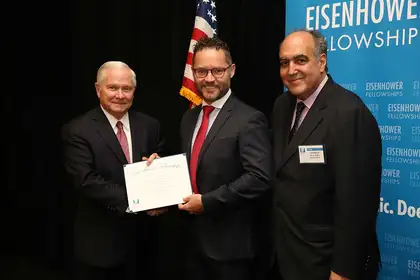
Professor Chris Gallavin (centre) with Robert Gates (US Secretary for Defence 2006-2011) and George de Lama (President of Eisenhower Fellowships).
Disruption. Transformation. Innovation. Inclusion. Collaboration. Community. Just some of the buzz words evoking changes afoot in the tertiary education sector and in global debates about its future – the focus of Professor Chris Gallavin’s two-month stint as an Eisenhower Fellow this year.
Professor Gallavin, Deputy Pro Vice-Chancellor for the College of Humanities and Social Sciences, was the first New Zealander since 2015 to be a Global Fellow with the prestigious Eisenhower Fellowships.
His Eisenhower journey started in 2014, when he met Wil McLellan of EPIC in Christchurch. “As a recent Eisenhower Fellow, Wil spoke of a programme that had clearly expanded his horizons well beyond his wildest dreams.” Inspired, Professor Gallavin applied three years later, meeting the “daunting” criteria.
He visited 70 institutions in 14 cities across America, including state universities, Ivy League institutions, community colleges and education think tanks. He spoke with dozens of education visionaries and leaders, including the team of the President of Arizona State University, Michael Crow – a prime example of new directions and change in tertiary education ethos and delivery that New Zealand could learn from.
His observations and conversations from the trip highlight the urgency to plan and prepare for significant change here too.
“Being ready to meet the challenges and demands of evolving communities and demographic shifts, sustainable business models and pressing global problems is critical to the relevance and survival of universities,” says Professor Gallavin. “And as our workplaces and lives morph in the wake of a rapidly unfurling digital revolution, tertiary education as we know it will need to change too,” he says.
In a series of LinkedIn articles, Professor Gallavin shares some of his insights and vision for New Zealand’s higher education sector. He says that the opportunity to observe universities up close in the US reinforced his belief that the future of higher education is incredibly bright.
“I feel jealous of our youth, as we live in what I believe to be, perhaps the most exciting of times in human history. Global problems abound – of course – but with that come opportunities to do things fundamentally different for the advancement and well-being of humanity and all life with whom we share our existence.”
He also lists key challenges for universities as: the changing nature of employment, a multiplicity of competitors, a broken funding model, student recruitment and retention challenges, inflexibility of curriculum, digital delivery models and a silo over cooperative mentality of operation.
His project as a Global Fellow encompasses not only his work but a life mission, involving; “the implementation of my vision of the university of the future…that sees universities as community partners in addressing the imperatives of our time; sustainability, equality, equity, social enterprise, social justice, economic development and entrepreneurialism.
It’s a vision in which; “qualifications come as a consequence of a university's pursuit of a meta-narrative mission – we are not degree factories. I see universities as a community of scholars (academics, professional staff and students alike) working together and in collaboration with government, industry, and society, to change the world by actualizing the society we individually and collective want to see.
“The empowerment of individuals through attaining qualifications is a vital consequence of that mission; the importance of which must not be underestimated. But we are more than qualification attribution centres. Humanity is capable of working collectively to solve all of the most pressing issues of our time – but that will not happen by accident – it will happen by design.”

Professor Gallavin reading NZ poetry in Washington DC.
Universities in crisis?
Predictions over the future of work, the advancement of artificial intelligence (AI), globalisation, and computerisation have combined with falling budget support for universities and increasing industry dissatisfaction with the skill and ability level of graduates, to create a perfect storm in higher education, Professor Gallavin says. His trip highlighted major concerns, such as curriculum inflexibility.
“Universities are masters of Newtonian approaches to problems in which an ordered, rational approach is taken to problems by dividing them into logical units along traditional discipline lines. Rather than training people to deal with the organic and chaotic, universities are good at creating linear experts specialising in particular forms of thinking and problem solving. It is not a case that the future has no need for such skills, but that an over reliance on such an approach fails to adequately prepare citizens for tackling the ‘Grand Challenges’ of our time.”
A key theme for his trip was university reform, including how to structure qualifications and work with public and private entitles to better engage those traditionally disenfranchised from secondary school education due to race, class or minority status. Another is how universities can leverage digital and disruptive innovation to implement engagement and retention strategies identified within this framework.
“From fully online, to public/private partnerships through to blockchain credentialing – the future of life-long-learning is distributive, meaning that traditional providers are, and will be, only one of a number of options in higher education,” he says.
Centres of collaboration - not centres of knowledge
Universities that see themselves as centres for the creation and dissemination of new knowledge represent “old world thinking,” he says. “The university of the future needs to conceptualise itself as a centre of collaboration for the collective creation and dissemination of new knowledge.”
Read Professor Gallavin’s articles first published on LinkedIn:
The Modern University: The Challenges and Opportunities
The Modern University: Exploring US Innovation